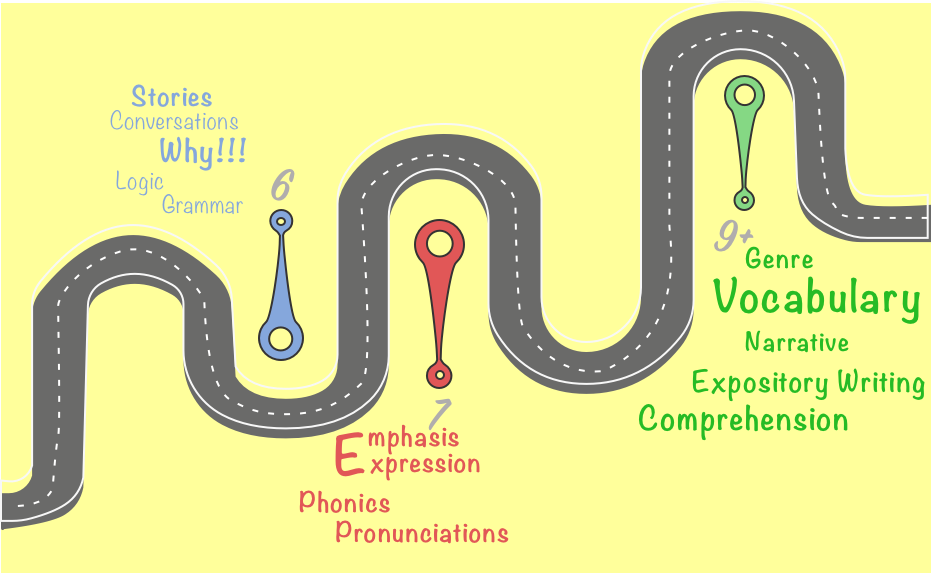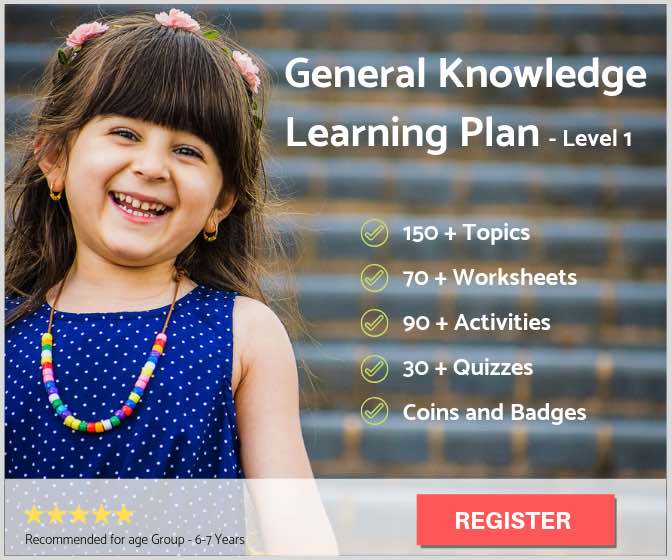Reference to children in the age group of 6-12 years
The beginning of proper formal schooling also marks the beginning of the identity formative years of your child. During these few years (Ages 6-12 years), your child is constantly going through cognitive development and learning. This learning is interpreted as milestones of child development; especially reading and writing milestones. Your child accomplishes a certain set of tasks at a certain age. Milestones of child development are those certain tasks that your child is able to accomplish.
However, it is not necessary that the reading and writing milestones have to be achieved. Some children might have delayed learning or learning disabilities which can be a deviation from a normal developmental path. According to the Annual Status of Education Report (2016), around 48% of students have difficulty reading in textbooks meant for their grade. The main reason for this is due to delays in the stages of child development. Hence. these reading milestones and writing milestones are just a universal marker. A yardstick to help us understand child development. Hence exceptions can always be there.
Stepping Stones
Reading and writing milestones for first grade children (6-7 Years)
Once your child turns 6 and starts their primary school, they start on a very important developmental journey. The first two years of schooling is key to your child’s reading and writing milestone development. Around the ages of 6-7, the child begins familiarizing themselves with the basic reading and writing concepts, such as punctuation, capitalization, and “sounding out” unfamiliar words and learning their correct pronunciation. They are also able to read simple stories which are familiar to them and self-correct themselves when they make a mistake while reading aloud. Children also show the development of their visualization skills and they are able to comprehend and derive meaning from pictures during this stage.
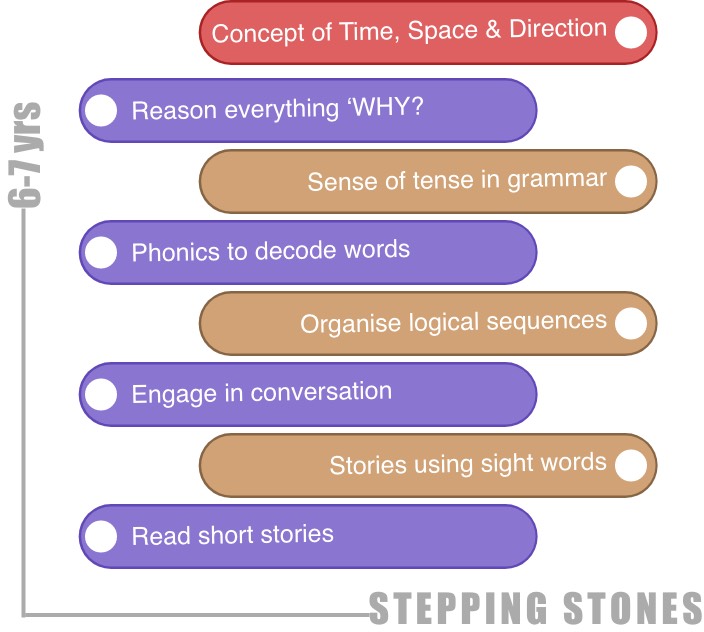
According to About Kids Health, the vocabulary of children increases by around 2000 words during this stage. They are able to compose sentences of medium level of difficulty and count up to 10 objects at a time. Development of writing skills occur overtime. However, the basic learning occurs at this age. Children also become familiar with concepts such as time, direction, color and shape. They also learn the basic rules of phonology and try out new words and understand concepts like rhyming and describing objects and engaging in conversation. The development of the initial sense of reasoning also occurs with children starting to ask “why?” in their interactions.
Enhancing Abilities
Reading and writing milestones for second and third grade children (7-8 Years)
Once children cross the age of 7 and start second grade, there are significant accomplishments in child development in the next two years. Children achieve their potential reading skills with the help of the reading milestones of this stage. Hence, there is a development of improved reading skills. By the age of 7 or 8, children are able to read longer books independently and more fluently. They develop the ability to gain control of what they are reading by using emphasis and expressions properly. Children also become aware of the nuances of humour and develop phonological awareness. They are able to easily identify and use plurals, verb tenses, etc. At this stage, children learn by modelling. Hence, they are able to catch correct pronunciation, new words and phrases, and even figures of speech.
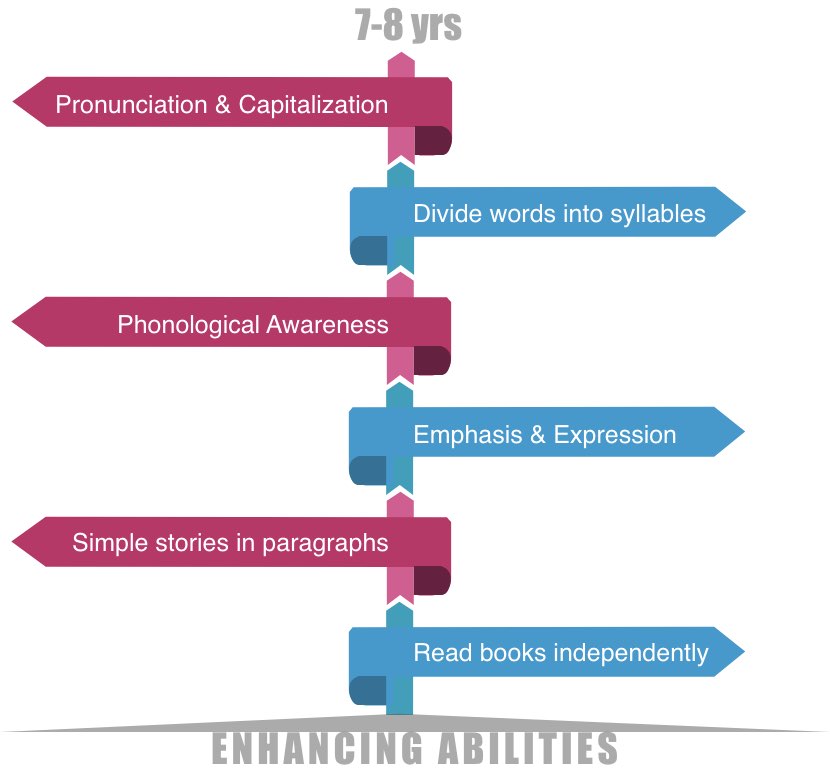
Studies done on child development, show that by this stage, children are able to properly express their needs and doubts and can hold proper conversations.By this stage, children develop a better understanding of grammar rules. The ability of children to write more than just a sentence or two is one of the writing milestones of this stage. They develop the usage of proper punctuation and can correctly spell a large number of new words. Their language development reaches the level where they are able to write small stories and instances. Children also start understanding the concept of paragraphs and incorporate it into their writing. The development of a longer attention span, which is important for improving their writing skills occurs during this stage. Children also learn how to writer-controlled vowels (shower, roar, leader, etc) and can write more complex words.
Specialising Skills
Reading and writing milestones for fourth to eighth-grade children (9-12 years)
The latter half of primary education teaches skilled language development in children. This stage of child development deals with perfecting and understanding the technicalities of reading and writing. Children achieve various reading and writing milestones during this stage and form a critical language ability. Once children reach the age of 9, they start reading and writing on various topics for fun. They start writing down their thoughts properly. Children also start understanding that a particular style is required to write a particular topic. According to studies, children between the ages of 9-12 learn and are able to apply various grammatical rules of syllabication and inflectional endings. Once they cross the age of 12, they also become aware of derivational endings and word etymology.
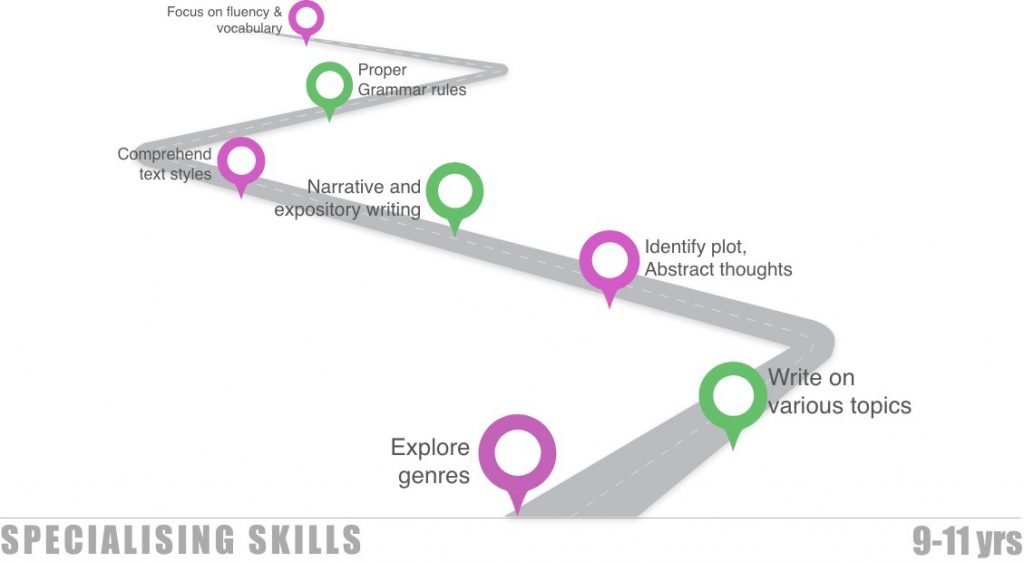
The reading milestones that are significant to this stage of child development include an overall comprehension of texts. Children start exploring and widening their reading material by branching out into various genres like biography, poetry, and fiction. They also develop a higher comprehension skill which identifies plots, symbolism, abstract thinking and figurative language. Hence, children become capable of extracting information for reading materials. By this stage, children are familiar with the basic structure of the language hence they focus on vocabulary and fluency. It becomes easy for them to identify speech and literary devices such as similes and metaphors because of their advanced language development. Due to the development of analytical and derivative skills, figuring out the meaning from a text also becomes easier for them. The establishment of the foundation of usage and knowledge of expository, narrative, and persuasive text also occurs during this period of child development.
Additional Reading:
How to develop thinking and learning skills in kids
Tips to motivate children to learn
Learning Disabilities
According to the CDC, learning disabilities are those disorders which hinder the process of optimal child development. Dyslexia, Autism, etc are some examples of learning disabilities. Learning disorders can also be present with emotional or behavioural disorders, such as ADHD or Anxiety. Children struggling in school and having difficulty in one or more areas of learning is a common characteristic. Children having difficulty reading letters, words, or numbers can be a symptom of it. Moreover, they also might have delayed reading and writing skills and difficulty in remembering what was said or read out. Few more symptoms of learning disorders which affect child development.
- Dyslexia – Difficulty reading due to problems identifying speech sounds and learning how they relate to letters and words.
- Dyscalculia– Difficulty understanding number-related concepts or using symbols or functions needed for success in mathematics.
- Dysgraphia – Difficulty with writing (which includes handwriting, typing, and spelling)
However, learning disorders do not affect children’s overall intelligence or motivation.
Children with learning disorders need specialized help and instructions most of the time. There are special education services which are available in schools which especially cater to students with special needs. With the help of counsellors, trained instructors, parents and healthcare professionals, the right referrals and treatment for children with learning disabilities is possible.
Methods to enhance reading and writing skills
Interest-oriented Materials
This stage in child development is often marked by a short attention span. So, it becomes necessary to engage children in such a way that they pay attention to it. Introduction of subject matter which they have a particular interest in, for eg: cars, animals, fairy tales, etc as a way to improve their reading and writing skills is recommended.
Constant Communication
According to studies conducted by the American Speech-Language-Hearing Association, children who are constantly exposed to an environment involving communication show better cognitive skills. Children who constantly speak, whether in the household setting or schools, exhibit improved language skills. It is necessary to read aloud to children during this stage.
Educational Games and Activities
Games like ‘Guess who am I?’, ‘I spy’, ‘Scrabble’, etc encourages your child to learn and express more. The availability of various educational computer games helps in the development of children’s writing skills as well as reading skills.
Writing a Journal
Children who are encouraged to write journals or diaries from a young age show a higher language ability. During this stage, children should be encouraged to start writing more. It could even be a dream diary or something as simple as lists. Writing more ensures the proper achievement of milestones in child development.
Inculcating a Reading Habit
Children who are avid readers have language prowess over those who don’t read. According to studies conducted by the American Speech-Language-Hearing Association, children who inculcate the habit of reading from early on show higher language development. Moreover, it also improves their writing skills as well as reading skills.
Additional Reading:
How to motivate your child to read
8 tips tobring up a creative child
References:
1. Learning disorders: Know the signs, How to help - MayoClinic [...]
